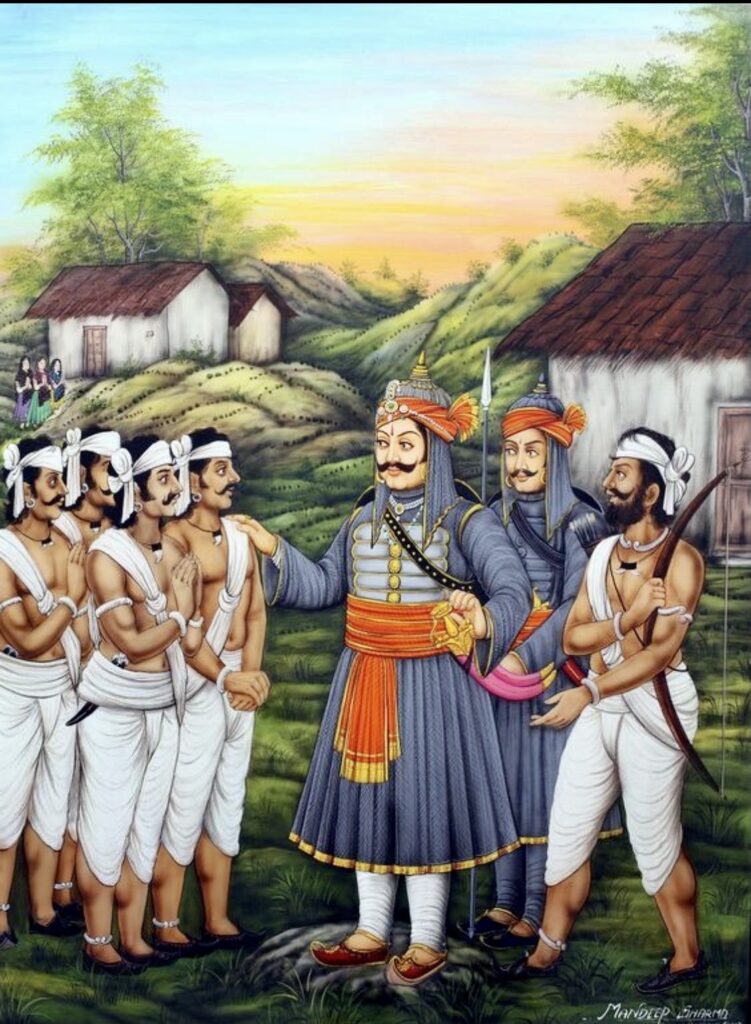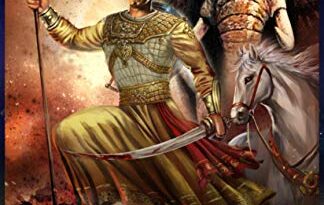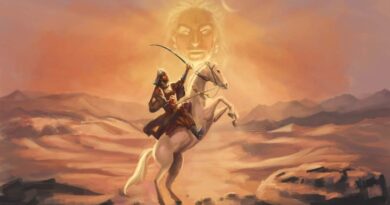Bappa Rawal: humbled Arabs-Save Bharat from Muslims
Bharat has been a country of peace and prosperity since ancient times, Invaders have continuously attacked it since the times of Alexander. But the first Muslim invasion of this land was done by Md. Bin Qasim in 8th CE with the year 712 CE. Bharat never failed to oppose any invasion, unlike other ancient civilizations like Egypt, Mesopotamia, Persia, etc. This invasion was first endured by Raja Dahir and relayed by Bappa Rawal who made the Arabs run for their life and pursued them till their homeland. Because of the history being written by the leftists and Islamists, it was never mentioned how valuable the attempts of Raja Dahir to repulse the Muslim attacks were, and how bravely Bappa Rawal killed the Arabs and showed them their place.
Bappa Rawal Origin

Bappa Rawal was a direct descendant of the Guhilote dynasty which finds its origin in the lineage of Luv (Eldest son of Bhagwan Ram). During childhood, he was taken to the safety of the jungles of Bhinder in Mewar by his mother where he was under the protection of Bhils. This made an association between Bhils and the royal lineage of Mewar which lasted even to this date, it also helped Maharana Pratap during the later times to accumulate strength and fight back against Akbar “the not-so-great”. He was trained with the Bhils during his childhood and learned new ways of warfare. Later when Bappa Rawal grew young he came back to Chittor and was received well by the Mori King, Manmori, the then ruler of Chittor. Bappa Rawal was designated as a “Samant” and granted a suitable estate.
First Muslim attack in Bharat
It was the same time when the arms of Islam first crossed the Sindhu River and entered Bharatvarsha. Md. Bin Qasim of Arabia aged 17 attacked Raja Dahir Sen of Sindh at around 712 CE. Several attempts by Qasim were repulsed by Dahir and his valorous brother. Then the Buddhists of Sindh, who were alienated from Dahir, joined hands with Qasim. They helped the Qasim Army to know the vital positions of invasion, provided rations, and at the Battle of Aror Qasim forces won because of the locals’ treachery against Dahir. Qasim beheaded Dahir and his brother, captured Dahir’s daughters, and forcibly carried them off to Baghdad, to offer to the then Caliph of Arabia, the cruel Hajjaj Bin Yusuf, as sex slaves. But the bravery of these two daughters of Dahir is also unparalleled, how they avenged and killed the Qasim is very valorous.

Now Qasim, armed with the loot of the riches of Sindh, was able to raise an army of mercenaries and moved eastwards to attack Mewar. Raja Dahir’s younger son also named Dahir escaped to Chittor and informed Bappa Rawal about the fall of Sindh and how women were being abducted as sex slaves. Sex slavery was unheard of in Hindu civic and military life at the time. Because whenever Hindu armies used to fight, the common citizenry was never touched and only the transfer of power used to occur between the fighting rulers.
Bappa Rawal Making an alliance

Bappa Rawas was enraged when he learned of the treatment of women by Qasim but also understood the need for a combined Hindu alliance to check the onslaught of these murderers from alien lands. He readied himself for a long haul as he anticipated that these attacks by the Mlechchhas (those with evil intent) would go on ceaselessly and a continuous struggle would be required.
Bappa Rawal, leading the Mewar army, struck an alliance with the brave Nagabhatta1 of the Gurjara-Pratihara dynasty ruling the Malwa region, in today’s Madhya Pradesh. Bappa also allied with Pulakesiraja and Jayabhatta of Gujarat and the joint Rajput forces fought the Arab Muslim invaders in the crucial Battle of Rajasthan. Nagabhatta approached Chalukya King Jai Simha Varman of Southern India who sent his son Pulkesiraja to assist the Hindu formation.
First Hindu Army vs Arab Muslim Army
When Md. Bin Qasim looted Sindh he left for Arab with captured daughters of Dahir and appointed one of his trusted men Junaid Al Marri to lead further campaigns. He led the Arabs and was partially successful in southern Gujarat, Malwa, and southern Rajasthan. In 738 CE, somewhere around Jodhpur of present-day Marwar, this decisive battle was fought between 5000 to 6000 Hindu troops against 60,000 Arabs. The Arabs were comprehensively routed and Junaid was killed. The Umayyad dynasty of Arabia was sent a clear message by the Hindus to stay away from this pious land. What Arabs were able to achieve in a few decades in the Middle East, Persia, Mesopotamia, Syria, and North Africa, was denied vehemently on our land by the Triple Alliance led by Bappa Rawal.

The Arabs were decimated in the battle of Rajasthan and chased back up to Iran by Bappa Rawal. The Arab historian Tod wrote that “Not a single place of refuge could be found against the Hindu fury”. Bappa did not relent and continued to chase the Arab invaders up to Iran. He found the city of Ghazni in Afghanistan, in possession of one Salim. Bappa defeated Salim and married his daughter. He also put his nephew in charge of the city and thus secured Afghanistan as a Hindu Kingdom for a few centuries to come. He erected checkposts at regular intervals on his way back from Arabia. These were instrumental in halting further invasions by Islamic armies for the next four hundred years.
Bappa Rawal Securing Western Borders
After Bappa’s triumphant Arab campaign catapulted him to the status of a miraculous warrior, he already annexed Chittor from the Mori dynasty before the battle of Rajasthan, proclaiming himself as ‘Maharao’ Bappa Rawal. The Bappa’s campaign had another positive effect on the Hindu kingdoms of Lahore and Peshawar. In 761 the Afghans of Kirman and Peshawar, which were originally a Coptic colony of Egypt, crossed the Indus to travel eastwards and attack the Hindu rulers of Lahore. Within five months of this event, seventy battles were fought with varied outcomes. In the last one, the Rajput Hindu prince of Lahore carried his army to Peshawar and a truce was signed.

The Rajputs erected the fortress of Khyber in the chief pass of Daman-e-Koh. For two long centuries after this, peace prevailed in what is known as upper Sindh and Punjab today, and India was rendered accessible only through southern Sindh, thus narrowing the chances of Islamic invaders attacking Hindustan.
Bappa Rawal reached up to Afghanistan and Iran and forging matrimonial bonds with the locals there meant the continuance of Hinduism in these regions for centuries to come. Bappa married daughters of kings of the kingdoms west of the Sindhu River, and as many as 130 sons were born to him from these women and after the return of Bappa to Mewar these sons were identified according to the clans of their mothers. Today, these people are referred to as Naushera Pathans. He motivated other rulers about the way to deal with Muslim forces. Another king who was a contemporary of Bappa was Lalitaditya Muktapida (AD 724-760), who allied with Yashovarman of central India. He was merciless in his slaughter of Arabs and ordered that half of the Islamists’ foreheads be shaved off as a mark of their submission. The Jats in Sindh also handed a crushing defeat to later Arab invasions and so did the Pratihara kings in Multan.
This led to the insurance of Bharatiya land against the Muslim invaders for five hundred uninterrupted years, Arab Islam was not allowed to cross the Sindhu River by our glorious ancestors. Thus, this not only saved the Hindus but also the entire free world and the global consciousness from subjugation and slavery. Now it is solely upon us to revive the name, life, and deeds of this great Hindu son who laid the foundation for a thousand-year-long struggle against Islamic imperialism.



